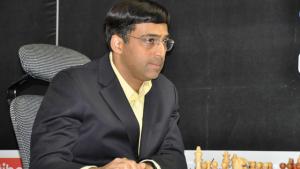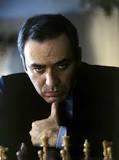
Kasparov vs. Karpov | World Chess Championship 1984
With Anatoly Karpov having "inherited" the world title, he was eager to win as many tournaments as possible to prove that he was worthy of the title. And this he did.
Besides winning such tournaments as Milan 1975, Las Palmas 1977, Bugojno 1978, Montreal 1979 (the "Tournament of Stars"), Linares 1981, and many others, Karpov simply had a phenomenal score against all of his main competitors.
It is easy to forget today -- after the emergence of Garry Kasparov and Magnus Carlsen -- but Karpov dominated world chess in a way that nobody had done in a long time, perhaps ever. He also defended his title twice in matches against Viktor Korchnoi, the first time since the qualification system was instituted in 1948 that the champion had defended his title more than once in a row.
But life at the top of world chess is never easy, and soon a new force arrived in Garry Kasparov.
Born in Baku, Azerbaijan (then USSR) in 1963, Kasparov began playing at a young age and rapidly moved up the ranks of Soviet youth chess.
In fact, his rise from an unrated young player to one of the top players in the world is shockingly rapid (although a lack of rated tournaments at that time in the Soviet Union explains it somewhat -- a young player could develop in obscure (but strong) tournaments and then suddenly burst on the scene internationally).
In 1978 he was invited to the Sokolsky Memorial in Minsk. An exception was made in inviting the young and talented Kasparov -- but it was him who took first place and gained the Soviet master title.
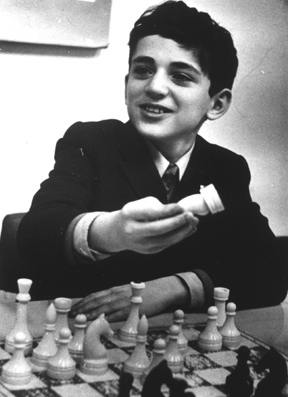
In 1979, still without a FIDE rating, he played in a top-level grandmaster tournament in Banja Luka, Yugoslavia. A Soviet chess official supposedly made a mistake in sending Kasparov, thinking the tournament was a youth event.
Nevertheless, Kasparov won it, and emerged with an initial FIDE rating of 2595 -- 15th in the world. It is impossible for something like that to happen today -- but times were different then.
Kasparov won the world junior championship the following year, and also became a grandmaster due to his result as a representative of the Soviet team in the 1980 chess olympiad. So, basically in the space of three years, he went from an unrated youth known only locally to one of the top grandmasters in the world.
By 1983, he was rated only second to Karpov, and soon he began cutting through the candidates cycle, first defeating Alexander Beliavsky, then Korchnoi, and finally Vassily Smyslov -- the world champion of 1957, who at the age of 62 nevertheless reached the finals of the candidates matches.
Thus Kasparov earned the right to challenge Karpov.
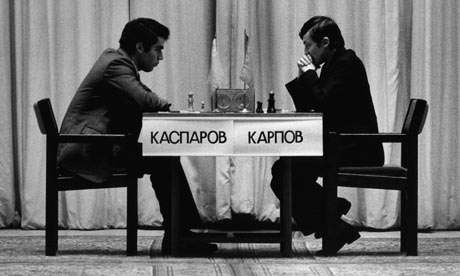
Their first match, in 1984, was one of the most controversial matches in chess history. The rules of the match required six wins, draws not counting, to win the match. After nine games, Karpov was already up 4-0, and it looked like the match was over.
In the sixth game of the match, Karpov managed to win with black, first defusing the pressure of Kasparov's active pieces, and finally winning an interesting rook and pawn ending:
However, Kasparov then utilized a strategy which was not yet seen in world championship matches (largely because most of the matches until then had a limited number of games): he abandoned hope of immediately catching up in victories and showed that, with the two players being close to equal in strength, he could draw at will.
Seventeen draws followed. This did not change the score of the match -- Karpov was still up 4-0 -- but putting up this resistance changed the landscape of the match.
Kasparov hoped Karpov would get tired and lose patience, finally overstepping in an attempt to force the match immediately.
Karpov won game 27, which gave him a 5-0 lead and put him one game away from retaining the championship. Kasparov is considered by many to be the best ever, but if things had gone slightly differently -- if Karpov could have won one more game and ended the match -- chances are he would have been stopped in 1984, completely changing the history of chess.
Would he be able to psychologically recover from a 6-0 loss and challenge Karpov again? Certainly Kasparov was great before the match with Karpov -- he held the number one rating before the match -- but these psychological elements play their role, and this surely was a crucial time for his career.
Slowly the match began to turn. After four draws, Kasparov finally won a game -- the first time he defeated Karpov in his life. Then the draws again, 14 more; and the match had by that time gone longer than any other world championship match in history.
But then Kasparov won games 47 and 48. And suddenly the match stopped.
The ending of the match by FIDE president Florencio Campomanes was certainly controversial.
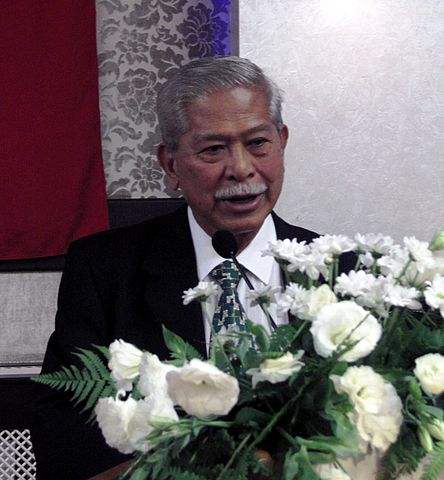
Allegedly the decision was taken in the interest of the health of the players, who had played for such a long time. But it was a strange moment to end the match, after Kasparov had just won two games.
Much has been written about this decision, and both players have claimed that the other was the one who wanted the match canceled. Many have said that Karpov wanted the match canceled because he had lost momentum, but this seems questionable when he only needed one game to dispatch the challenger.
A new match was scheduled for the next year, with Karpov's two-point lead erased.
In spite of some bad blood, the new match began as scheduled. Perhaps you can say that, behind the scenes, both players had their reasons for wanting the match to end. Karpov may well have been quite tired and could perhaps consider that it would be worth giving up the two-game lead for a long break, while Kasparov certainly had reason to want the two-point deficit erased.
But publicly, of course, both players had to insist that they were the one who wanted the match to go on.
In the 1985 match, Kasparov came out of the gate strong, winning the first game in excellent style. Kasparov had made some deep opening preparations, introducing into his repertoire the g3-variation against the Nimzo-Indian.
Here he shows what we now know to often be the case -- that the presence of doubled and sometimes even isolated c-pawns is not fatal in this variation, and that the open b-file and cramped black pieces can give White the advantage.
The match had an unusually dramatic ending. In the 24th and final game (naturally, the 1985 match was of a limited duration) Kasparov led by one point. Karpov had to win the last game with the white pieces in order to tie the match and retain the title.
But in a tough Scheveningen Sicilian, Kasparov even managed to win, thus becoming the 13th world champion.

As part of the negotiations for the new match (after the 1984 match was stopped), Karpov was granted an immediate rematch in the event of a loss, as some compensation for wiping out his two-point lead.
Thus the two played again in 1986. And again they played in 1987 when Karpov, in the meantime, had gone through the candidates matches. And yet again in 1990.
All in all, Kasparov and Karpov played five matches. Kasparov won three matches, while the first match was aborted and the 1987 match was drawn when Kasparov won "to order" in the last game (he needed to win to tie the match, just as Karpov had in 1985).
Each match (besides the first one) was close and hinged on the last game. Overall, Kasparov won 21 games to Karpov's 19 -- yet this small margin was sufficient to retain the championship each time.
Thus far there has been no rivalry in the chess world as great as the Kasparov-Karpov battles. The two players names are inextricably linked -- their rivalry pushed each of them to reach higher levels than they would have alone.
RELATED STUDY MATERIAL
- Read the previous article in this series, Clash of Champions: Karpov vs. Korchnoi
- Watch GM Sam Shankland's 7-part video series on Kasparov.
- Play the Kasparov-Karpov match in the Chess Mentor.
- Practice your world-championship-level combinations in the Tactics Trainer.
- Looking for articles with deeper analysis? Try our magazine: The Master's Bulletin.

